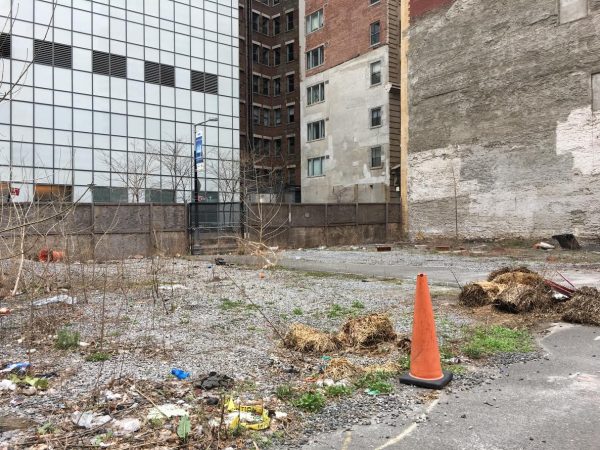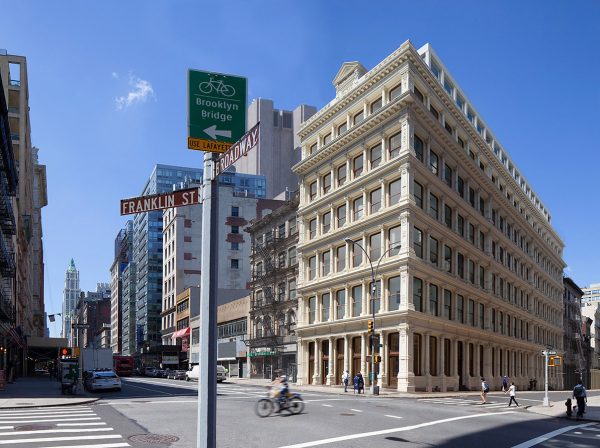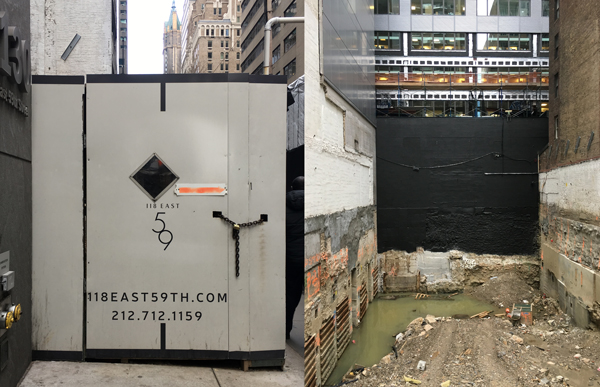TRD Special Report: The site at 111 Washington Street was supposed to be Richard Ohebshalom’s entry into the big leagues. When his firm Pink Stone Capital acquired title for the property through a deed in lieu of foreclosure in July 2011, Ohebshalom envisioned a 500-unit luxury residential tower. The project was meant to be completed by 2014. Instead, it hopped on and off the market over the past three years. Last month, the saga over the site erupted into a public family feud when Ohebshalom sued his father, Fred, accusing him of trying to secretly sell the property for a song.
Sources said that the site was at one point used to house port-a-potties for the Port Authority of New York and New Jersey, which is working on the World Trade Center redevelopment and paid Pink Stone a nominal rent for the privilege.
111 Washington is far from the only site in the toilet. All across the city, new residential projects are experiencing hiccups and delays that not only saddle developers with added expenses but also increase the chances that their products will launch in a soft market. In some cases, developers simply haven’t raised the funds needed to complete the project. In others, construction snags, infighting between partners and other complications have derailed plans.

111 Washington Street (Credit: E.B. Solomont for The Real Deal)
“Every day you carry it longer than your anticipated time is money off the project,” said MNS’ [TRDataCustom] Andrew Barrocas. “It definitely eats into your profitability.”
It’s tough to pin down exact numbers for how many projects are paralyzed. The city’s Department of Buildings no longer keeps count. Walk most Manhattan neighborhoods and you’ll see many: Tribeca, for example, has Abra Construction Corp.’s 83 Walker Street, which was approved by the Landmarks Preservation Commission in 2011; 403 Greenwich Street, which is being developed by Colonnade Group and Olympic Real Estate; and Samson Management’s 15 Hubert — with an alternate address of 407 Greenwich — which was expected to wrap up in early 2016, according to a sign at the site. There’s also Knightsbridge Properties’ Cast Iron House at 67 Franklin Street, a 13-unit condominium where sales launched in 2014 and a sign reads, “Anticipated completion: June 2015.”

Cast Iron House
Knightsbridge CEO Jourdan Krauss said his firm spent three years renovating the building’s exterior, including re-casting 4,000 pieces of decorative cast iron. The firm, which paid $15 million for the building in 2002, encountered unexpected snags, such as discovering cracks in the building’s support columns. Then in March, after contractor Foundations Group walked off the job (claiming it was owed $2.1 million), Knightsbridge filed a lawsuit alleging Foundations’ failure to complete the work cost the developer $1.5 million.
“It has taken longer, in all truth, than we initially hoped,” Krauss told The Real Deal early this year. “You put together a time schedule and say, ‘OK, this is if all goes well.” He said the project’s model residence was just completed and all of the units will hit the market by the spring. The building is “very close” to obtaining its certificate of occupancy, according to Krauss.
“We’re calling it immediate occupancy,” he said.
Navigating the DOB “maze”
Construction delays are part of the development game, although it’s hard to pin down exactly how many projects are taking longer these days.
The city’s Department of Buildings used to track stalled construction sites, defined as jobs with no work completed for three months or longer. Owners could also voluntarily add their project to the list and agree to maintain site safety in exchange for preventing their permits from lapsing for 12 months. Between 2008 and 2013, the city logged 1,200 stalled sites. The DOB stopped tracking stalled sites sometime in 2014.
One of the reasons for big delays on sites, sources said, is the market boom of 2014 and 2015. Developers eager to command the returns seen in those years launched a large number of projects, all competing for a finite number of contractors and subcontractors, and the attention of a DOB mired down in red tape.
“Given the amount of construction projects going on in the city for the last five years, the city is resource-constrained,” said Adi Chugh, CEO of debt brokerage Maverick Capital Partners.
Frank Fortino, president of expediting firm Metropolis Group, said he’s seen an uptick in projects as well as new DOB regulations that make gaining approval a longer process. (Buildings located within floodplains, for example, now need to meet FEMA requirements.)
But Fortino said the DOB examiners lack consistency, which makes the approval process tough to navigate. “If there are 20 examiners, there are 20 different comments [on a proposal],” he said. “So you almost have to become a chameleon trying to think of that one individual and how to respond to their particular objections and issues.”
Empty pockets and sparring partners
Other sources said the problem in today’s market is not excess construction, but construction financing – or rather, the lack of it.
Owners who received land loans or predevelopment loans 12 to 18 months ago are finding that lenders are far less open to the prospect of doling out more money for construction.
“It’s like someone pulled out a magic wand and hit freeze on the condo market,” Chugh said.
Over the past year, some high-end projects got canned, such as the condo conversion of the Sony Building at 550 Madison Avenue and 287 Park Avenue South. Others are in limbo, including a ground-up condo project at 118 East 59th Street.

118 East 59th Street (Credit: E.B. Solomont for The Real Deal)
In 2014, Hong Kong-based Euro Properties paid $55 million for the site, where it planned a 40-story, 29-unit condominium and retail building to be designed by Soo Chan. Sales kicked off in November 2015, but construction is at a standstill. The job racked up 10 building violations and switched marketing teams from Brown Harris Stevens to Nest Seekers International. But Nest Seekers’ Ryan Serhant, who was tapped to work on the project last year, recently told TRD that “nothing ended up happening.”
Reached by email, Euro Properties CEO Neo Que Yao said he was pushed out of the project by a major shareholder, Yuzhou Properties Co. Ltd., which is reportedly weighing a sale of the site altogether. Representatives for Yuzhou did not respond to a request for comment.
In the Hudson Yards neighborhood, the site of a planned $3 billion development at 360 Tenth Avenue is also in limbo.
Frank McCourt, the former owner of the L.A. Dodgers, and business partner Mark Walter, bought the site in 2014 for $167 million — more than three times what prior owners Sherwood Equities and Long Wharf Real Estate Partners paid in 2011. In 2014, Hines joined the project as an equity and development partner. But sources recently told TRD that Hines is now out of the project.
A spokesperson for McCourt Partners said the developers are “100 percent committed” to completing the project, a 730,000-square-foot retail and residential tower.
“They have very exceptionally patient capital,” he said. “Their time frame is like 99 years.”
Several blocks away, a bitter feud between former partners Kuafu Properties, Siras Development and Sean Ludwick’s BlackHouse Development has stymied plans for Hudson Rise, a 47-story hotel and condo project at 462-470 11th Avenue.
[vision_pullquote style=”4″ align=”right”] “So you almost have to become a chameleon trying to think of that one individual and how to respond to their particular objections and issues.” [/vision_pullquote]
The dispute — which has spawned a flurry of lawsuits and countersuits — stems from Kuafu securing the $44.4 million construction loan for the development from UBS in August 2015 — a move Siras principals Saif Sumaida and Ashwin Verma said amounted to Kuafu trying to take control of the project.
In February 2015, Kuafu filed a petition to dissolve the partnership, citing “deadlock” and “no hope of reconciliation” between the parties. Meanwhile, Ludwick, who faces up to 32 years in prison after a fatal DWI crash, is no longer affiliated with the project. And a prime site in the city’s most happening area gathers dust.
The financial toll for a delayed project can be heavy — particularly if construction is already underway.
“A construction loan is a negative cash flow loan. You’re only spending money,” said David Heiden, managing partner of bridge lender W Financial Fund LP. “Every month that the job goes over cost, you have longer until the project generates cash flow. It’s like a little snowball rolling down the hill.”
Stalled commercial and 421a multifamily projects, for example, are taxed by the city as vacant land for the first three years of construction. However, if construction spills over into a fourth year, the property will be valued based on the percentage that is complete for the year.
[vision_pullquote style=”4″ align=””] “It’s like a little snowball rolling down the hill.” [/vision_pullquote]
“Loans are usually two to three years, and so if you’re stalled for six months and it’s supposed to be 18 months of construction, there goes your cushion. You’re screwed,” said one developer active in the city. “It costs money to keep permits and pay taxes, just to carry a property. It ain’t cheap.”
To minimize its risk, Heiden’s firm rarely funds ground-up projects for a new borrower. “You want to fund borrowers who are financially strong,” he said, “so they can write checks out of pocket instead of pleading they’re out of cash.”
One example of this (though not a W Financial deal) is One Manhattan Square, where Gary Barnett contributed a significant chunk of money from his own pockets to get construction underway, well before securing a $600 million loan package from a Deutsche Bank and Natixis-led consortium.
“Those pockets,” Barnett told TRD at the time, “were starting to feel a bit empty.”
Krauss, of Knightsbridge, said financial heft is a necessity nowadays.
“One of the most important things is, you need to have deep pockets,” he said. “Do you have the ability to weather any storms financially?”
Heiden said he tries to keep leverage low and he checks in frequently with borrowers to ensure the project is on track. “We want to be on top of it,” he said. “It’s not only the borrower’s problem. It’s my problem.”
For its part, the New York State Attorney General’s office seems to be taking a proactive approach. It’s convened groups of attorneys to discuss whether the requirements for offering plans should be tweaked to address new financial realities in the market.
“One of the things they [the AG’s office] are focused on is making sure there are sufficient funds for the project to be completed and final certificate of occupancy obtained,” said Jay Neveloff, head of the real estate practice at Kramer Levin.
Acts of God — and man
In 2015, a fire destroyed several floors of Delshah Capital’s Dorian, a 14-unit condo project at 221 West 17th Street, forcing the developer to suspend marketing temporarily. Michael Shah, CEO of Delshah, said sales have since resumed, and “construction is ongoing and moving along.”
Meanwhile, at 108 Leonard Street, Peebles Corp. and El Ad Group have wrangled with the Landmarks Preservation Commission for the approvals needed to convert the building into 150 condos. Peebles was also sued by a former collaborator, Daniel Hoeg, who claimed the developer reneged on a joint venture agreement to pursue city projects, Including 346 Broadway.
In February, Peebles secured $411 million in financing for the project, including a $334 million construction loan from Bank of America and a $77 million mezzanine loan from Apollo. But a month later came another setback when a judge nixed plans to swap the building’s mechanical clock with an electric system, which would have paved the way for a private apartment in the clocktower.
Developers who are aggressive when it comes to setting expected completion dates can also find themselves in a bind if the delays exceed drop-dead dates stipulated in many contracts.
That looks to be what happened at Glenwood Management’s 60 East 86th Street, a Thomas Juul-Hansen-designed condo with 15 full-floor units. In August 2016, three years after the developer paid $31 million for the property, New York YIMBY reported that “occupancy is probably imminent.”
But delays — which sources attributed to problems sourcing the limestone exterior — caused the developer to miss the target closing date outlined in the condo’s offering plan. As a result, Glenwood had to give buyers the right to rescind their contracts. “A lot of people took it,” said a broker familiar with the building, referring to the exit option. Now, the units aren’t attracting offers in the range of what people paid in 2014 when the building first launched sales.
[vision_pullquote style=”4″ align=”right”] “There goes your cushion. You’re screwed.” [/vision_pullquote]
Lexin Capital has sought to give itself wiggle room at 815 Sixth Avenue, where it is developing a 30-story hotel. During a recent visit to the project, a sign on the outside of the building which stated the project would be complete in March 2016 was covered up with the words “Summer 2016.”
Lexin’s president, Metin Negrin, said the project is near completion and that it suffered setbacks that are “just part of New York City construction.”
He said he added six months and an extra 10 percent of the projected cost to the project’s construction budget. As a result, he said, “We’re okay, budget-wise.”
Neveloff said lenders may ask borrowers to bring in more money if the project is experiencing slower-than-expected sales. “The lender doesn’t want the project back,” he said. “They want the developer to fix it.”
(To see a selection of properties under construction, click here)

